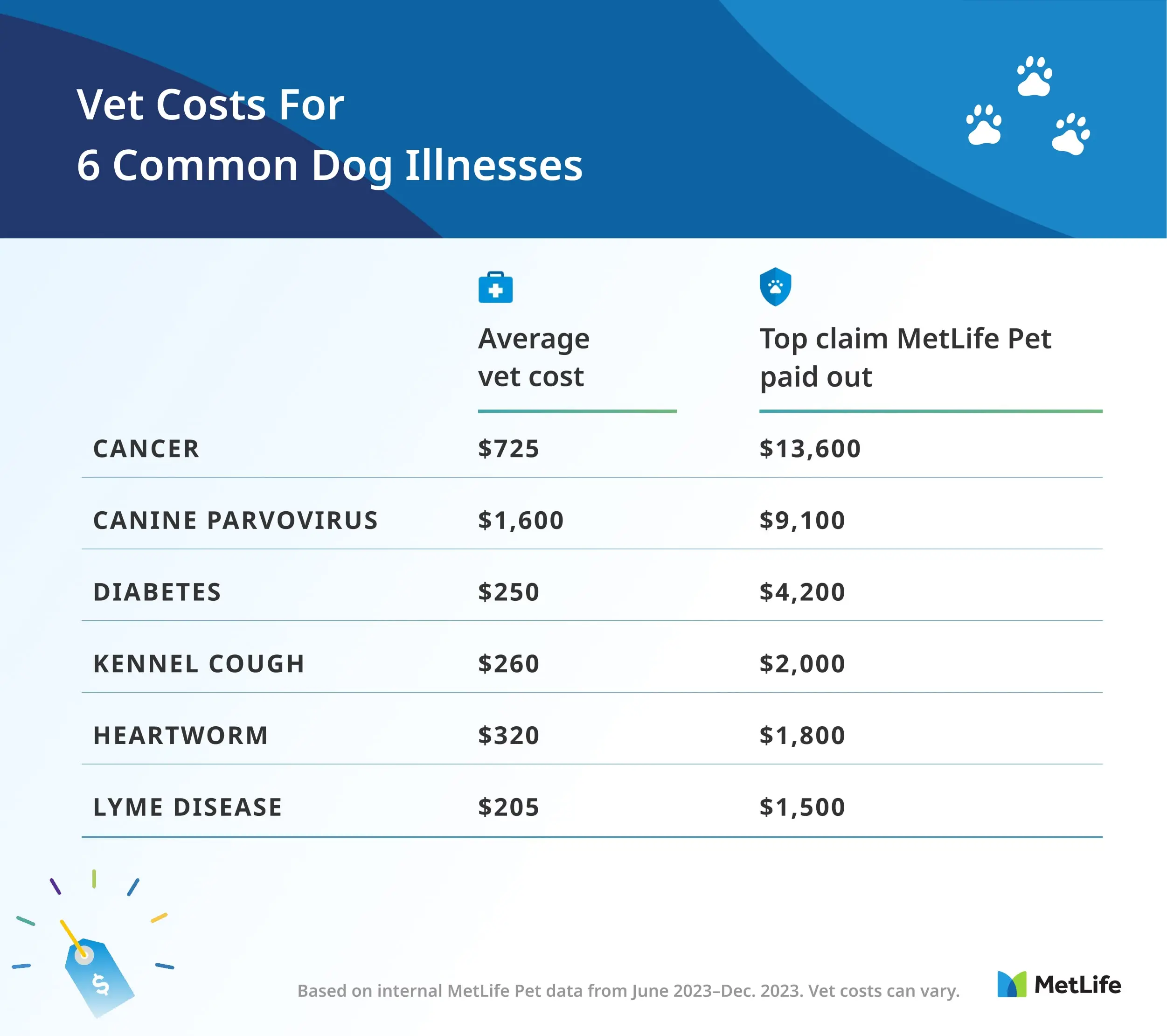PET HEALTH
Common Dog Diseases, Symptoms & Average Vet Costs
As a dog owner, it’s important to know the clinical signs of different diseases in dogs so you can spot them. Caring for a sick dog can be a challenge, but understanding the symptoms and treatments for different puppy diseases and dog illnesses, including those that may be transmitted from humans, can help.
The average vet costs associated with common dog diseases could be high — ranging from $30 to $1,600.1 That’s why routine checkups and regularly watching your dog’s behavior at home can help you spot illnesses before things get worse. Take a look at the image below to see the average cost of some conditions, and keep reading for the symptoms and cost breakdowns of each.
Pet Insurance May Help Cover Treatment Costs for Dog Diseases
Cancer
Average cost of a vet visit for cancer: $7251
Note: Costs can vary based on the treatment required, and can occur over months or years.
Cancer in dogs can be common. However, a cancer diagnosis doesn’t immediately mean there’s no hope for recovery. Your pet’s prognosis can depend on the type of cancer and how soon it was caught. Treatment generally varies from surgery to different therapies (immunotherapy, chemotherapy, radiation therapy, etc.) or a combination of treatments.
Cancer may be more prominent in older dogs, but it can happen to dogs of any age. Here are some clinical symptoms of cancer in dogs:2
- Lumps or bumps (tumors)
- Weight loss
- Muscle weakness
- Abnormal bleeding
- Vomiting or diarrhea
Notable cancer claim
When the pet parents of Petunia, a 2-year-old dalmatian from Pennsylvania, noticed she was pawing at her face one day, they took a closer look. To their surprise, their young pup had a bump on her lip. They took her to the vet for an exam, where it was diagnosed as melanoma.
Petunia’s parents agreed with the vet to surgically remove the tumor. The vet bill for her surgery and recovery medications came to over $5,700. But with their MetLife Pet dog insurance policy, Petunia’s parents were reimbursed almost $5,500. After the removal of the tumor, Petunia is on the road to living a healthy lifestyle so she can play with her family for years to come.1
Diabetes
Average cost of a vet visit for diabetes: $2501
Note: Costs can vary based on the treatment required, and can occur over months or years.
Canine diabetes occurs when a dog’s body either can’t produce insulin, or produces it but can’t regulate it. This affects the glucose levels in dogs’ blood, causing them to either spike or drop, both of which can be dangerous. Diabetes primarily affects older dogs, but all dogs are susceptible. Diabetes treatment typically includes giving your dog insulin shots to maintain their blood sugar levels and managing their diet and exercise.3 Work with your veterinarian to decide how to best treat and care for your dog with diabetes.
A diabetes diagnosis may be intimidating, but dogs can live long and healthy lives with proper diabetes management. Catching it early is crucial to giving your dog the best quality of life possible. Here are a few key symptoms to watch for:3
- Cloudy eyes
- Drinking and urinating excessively
- Lack of appetite
- Constant infections
Notable diabetes claim
Tank, an 11-year-old mixed pup from Ohio, was diagnosed with diabetes when he was around 9 years old. His pet parents use yearly vet checkups and medication — as well as lifestyle changes — to help manage it. When Tank went in for his 2-year follow-up exam, they found out he needed some adjustments to his medication. Between the exam, diagnostic testing, and new medication, the vet bill totaled around $1,900. After submitting a claim, Tank’s family were reimbursed over $1,700 for medical care that can give him another year of smiles and tail wags.1
Distemper
Average cost of a vet visit for distemper: $1,2504
Note: Costs can vary based on the treatment required.
Canine distemper is a highly contagious virus that can affect the nervous, respiratory, and gastrointestinal systems. This viral disease is transmitted through air particles and contact with an infected animal or surfaces the infected animal has touched.
Because there’s no treatment for distemper, a vet will administer supportive care to help fight secondary dog infections, dehydration, gastrointestinal upset, and neurological damage. Whether your dog recovers fully or not typically depends on how strong their immune system is and what strain of distemper they get.5
The symptoms of distemper vary depending on the stage your pup has reached. These are some of the signs your dog may display:5
- Discharge from the eyes or nose
- Loss of appetite
- Fever
- Diarrhea
- Seizures
- Muscle twitching or weakness
- Neurological problems
- Pneumonia
Two different vaccines can be given to dogs to help protect them against distemper. Dogs may receive the DAPP vaccine — which protects against five different viruses — or the distemper vaccine, which provides protection solely for distemper.
Canine Flu
Average cost of a vet visit for canine flu: $6006
Note: Costs can vary based on the treatment required.
The canine flu can be highly contagious and appears similar to the human flu. While it’s typically not deadly, some canine influenza cases can become serious and may cause your dog to develop pneumonia.7 One of the best ways to protect your dog against the virus strains that cause canine influenza is to get them vaccinated with the canine flu shot. It should be noted that, while the symptoms may appear similar, canine flu is different from kennel cough.
Canine flu symptoms can include:7
Kennel Cough
Average cost of a vet visit for kennel cough: $2601
Note: Costs can vary based on the treatment required.
Kennel cough, or infectious tracheobronchitis, affects a dog's respiratory system. It can be very contagious and caused by many different bacteria — although, Bordetella bronchiseptica is one of the most common.8 That’s why you may also see kennel cough referred to as bordetella and vice versa.
Because of how infectious it is, kennel cough is prevalent in shelters or other spaces where lots of dogs are kept in confined spaces. Isolation of sick dogs from their peers is key in slowing or stopping the spread.
Dogs usually recover on their own, but with severe infections, dogs may be at risk for pneumonia.8 Some of the symptoms of kennel cough are:8
- A strong, hacking cough
- Runny nose
- Depression
- Loss of appetite
Vaccines can help prevent kennel cough caused by bordetella, distemper, canine adenovirus-2, and parainfluenza.8
Notable kennel cough claim
Baxter, a 7-year-old mixed-breed dog from Virginia, loves going to doggy daycare to play with his friends. Even though he was up-to-date on his vaccinations, he started coughing one week and got diagnosed with kennel cough.
Baxter’s vet care totaled almost $700, but his mom’s MetLife Pet dog insurance policy reimbursed nearly $550 of the vet bill. Baxter’s vet had him avoid doggy daycare for a while, but he is now fully recovered and back to playing with all of his pals.1
Canine Parvovirus
Average cost of a vet visit for parvovirus: $1,6001
Note: Costs can vary based on the treatment required.
Canine parvovirus (CPV or parvo) is an infectious disease that compromises puppies’ digestive systems. A rare strain also attacks puppies’ hearts.9 It’s transmitted through the feces of infected dogs and can also live on surfaces that come into contact with infected feces for months. This disease can be deadly if not caught quickly, but parvo can be treated with hospitalization, intravenous (IV) fluids, and antibiotics.9
The parvo vaccine is considered one of the core vaccines for puppies. Parvo is primarily a puppy sickness, but it can affect unvaccinated dogs of any age. Some symptoms of dogs infected with parvo include:9
- Loss of appetite
- Vomiting and diarrhea (sometimes bloody diarrhea)
- Fever
- Lethargy or depression
Notable parvo claim
With all of the excitement and joy of bringing home a new puppy, it can be heart-wrenching to get a parvovirus diagnosis. This is what happened with little Topher, an Anatolian shepherd puppy from California. While he had received his first round of vaccinations — which included parvo — puppies are unfortunately still at risk of being infected until they receive all rounds of the vaccination.
Fortunately, his pet parents caught it early enough, and he got the treatment needed to make a full recovery. This life-saving care came with a vet bill around $10,400. Thanks to their MetLife Pet policy, Tohper’s parents received a reimbursement of over $9,100 — helping to ease the financial stress that can come with expensive, yet well-worth-it, vet bills.1
Lyme Disease
Average cost of a vet visit for Lyme disease: $2051
Note: Costs can vary based on the treatment required.
Lyme disease in dogs is a bacteria that’s transmitted through tick bites, and it’s just one tick-borne disease that can affect dogs. This bacteria attacks dogs’ kidneys and joints. You can help protect your dog from Lyme disease by vaccinating them, using a tick prevention program, and being vigilant when walking in wooded or grassy areas, where ticks thrive. Lyme disease can be treated with antibiotics.10
If your dog was bitten by a tick and is experiencing any of these symptoms, it could be Lyme disease:10
- Swollen lymph nodes
- Lameness or swollen joints
- Fatigue
- Loss of appetite
- In some cases, symptoms related to kidney problems
Most dogs may not show symptoms of Lyme disease, and if they do, it could be a few months after being bitten. If you know your dog has been bitten by a tick, you may want to get them tested for Lyme disease at the vet.10
Notable Lyme disease claim
Hiking through the forest preserves in Illinois with his family is one of Saber’s favorite things to do. This 2-year-old American pit bull never turns down an opportunity to explore! Even though his dad makes sure Saber is up-to-date on tick prevention meds, Saber had a tick bite after one of their adventures. When Saber eventually started acting lethargic, his dad knew it was time to get the bite checked out by a vet.
Saber received a positive test result for Lyme disease. He was treated for his immediate needs and sent home with antibiotics to recover. The vet bill came out to over $2,100, but we reimbursed Saber and his dad over $1,500.1
Heartworm
Average cost of a vet visit for heartworm: $3201
Note: Costs can vary based on the treatment required, and can occur over months or years.
Heartworm in dogs is a dangerous disease where worms clog a dog’s heart and major blood vessels. However, there are heartworm prevention programs that include monthly medication (like Ivermectin) and yearly testing to help protect your pup. Diagnosis and treatment can include X-rays, bloodwork, drug treatments, and antibiotics, depending on the stage of infection.11
Dogs in the early stages of an infection may show no signs. During this time, the worms build up in their heart and blood vessels and eventually may cause congestive heart failure. Here’s what to look out for:11
- Soft but persistent cough
- Weakness or lack of energy
- Shortness of breath
- Lack of appetite
- Weight loss
- Swollen belly
Notable heartworm claim
Lila, a 1-year-old mixed-breed pup, was enjoying an evening with her new dog mom outside of her Rhode Island home after being adopted. Fast-forward about 7 months, and Lila started showing signs that something was wrong. After taking her to the vet for diagnostics, Lila’s mom was told she had heartworms and would need to be hospitalized overnight for care.
Between the testing, hospitalization, and medications, the vet bill totaled over $1,100. With her MetLife Pet dog insurance policy, Lila and her mom were reimbursed nearly $1,000. After completing her treatment, Lila is back to enjoying sunsets on the porch with her mom and continuing her heartworm prevention program.1
Rabies
Average cost of a vet visit for rabies: $30
Note: Costs can vary based on the treatment required.
Rabies in dogs is incurable, but it’s mostly preventable with a vaccine. If it’s caught right away, your dog has a chance at surviving with another dose of a rabies vaccine, but as symptoms appear, it almost always becomes fatal. Rabies primarily affects the nervous system, causing erratic behavior and seizures.
If you suspect your dog has been bitten by wildlife or your dog exhibits any of the symptoms below, it’s a good idea to treat it as an emergency and take them to see a vet:12
- Paralysis
- Seizures
- Difficulty swallowing
- Excessive drooling
- Staggering
- Odd behavior (aggression, fearfulness, or being overly affectionate)
Help Protect Your Dog With MetLife Pet Insurance
Even with staying on top of our dogs’ routine care, sometimes they can still get sick. If they’re diagnosed with one of these common dog diseases — or any others — they’ll likely need medical attention, and possibly even hospitalization.
Here at MetLife Pet, we strive to help relieve some of the financial stress that can come with expensive vet bills. After all, being there for your dog is more important than wondering how you’re going to get them the care they need. A dog insurance policy with MetLife Pet can reimburse you up to 90% on covered expenses, and if you get our optional Preventive Care plan, you can get coverage for routine and preventative care — like vaccinations.13,14
Start your pet insurance journey by getting a free quote from award-winning15 MetLife Pet Insurance, so your dog and your wallet can be protected from diseases like these for years to come.
We Can Help Cover Vet Bills While You Focus on Your Dog’s Care




